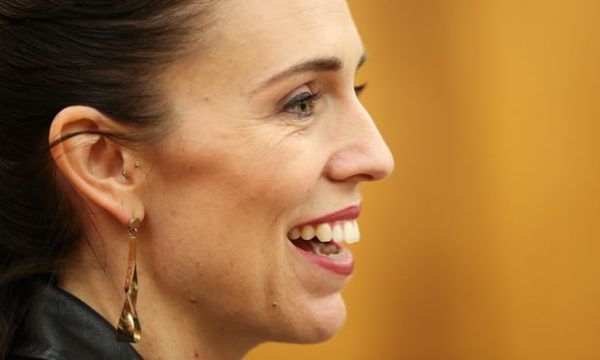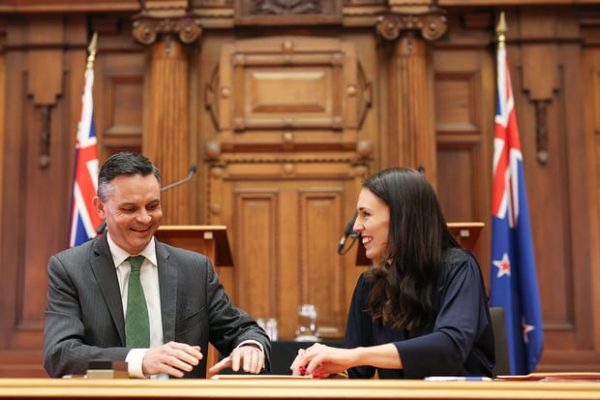Aus-NZ divisions exposed as Ardern takes tougher stance

Oz Kiwi opinion
It is very promising to hear New Zealand's new Prime Minister Jacinda Ardern reiterate today after being sworn in that, “New Zealand needs to keep advocating for New Zealanders in Australia. She has already spoken to the Australian Government, and says the relationship between the two countries is a priority.”
Australia-New Zealand divisions exposed as Ardern takes tougher stance
26 October 2017
The new Labour-led government is ready to take on its bigger and brasher neighbour over immigration and education.
Eleanor Ainge Roy - The Guardian
As the New Zealand coalition government begins to take the reins, there are questions arising about how the generally close relationship with Australia will be affected after 10 years of relative stability between the two nations.
Jacinda Ardern, due to be sworn in as prime minister on Thursday, said visiting Australia “as soon as possible” would be a priority for her, after tensions between the New Zealand Labour party and the Australian government emerged during the campaign.
Previous New Zealand prime ministers John Key and Bill English described the trans-Tasman relationship as “like family” and “cousins”, but Ardern has been cooler in her descriptions and hinted she is ready to stand up to New Zealand's bigger, brasher and richer neighbour. Here we take a look at how new policies announced by the New Zealand government yesterday may have an impact on relations across the ditch.
Winston Peters and Julie Bishop
The fiery New Zealand First leader, Winston Peters, has been rewarded with the deputy prime ministership and foreign affairs portfolios for throwing his weight behind Labour to form a government, despite them winning less seats than National.
Peters served as foreign minister in a confidence-and-supply deal with the 2005 Labour government, and caused waves on the international scene with his frequently undiplomatic and acerbic comments. “I think we can't deny it, in 2017 and our relationship is not what it should be,” Peters said on Wednesday. New Zealand and Australia needed to put their “cards on the table, and being honest would be a good start”.
In August Bishop, the Australian foreign minister, accused the New Zealand Labour party of colluding with the Australian Labor party and digging up information on the dual citizenship of deputy prime minister Barnaby Joyce.
At the time Bishop said she would find it “very difficult to build trust” with a Labour-led government, and Ardern hit back, accusing the Australian government of spreading lies. She said she had discussed with the Australian high commissioner her “disappointment” with the accusations, and criticised Bishop's “false claims”.
After Labour's win, Bishop said Ardern had offered an explanation “about the conduct of one of her colleagues whom I had criticised and she said [it] was wrong and inappropriate … I have accepted her explanation”. Malcolm Turnbull said there was no need for Bishop to apologise. Most of Ardern's negotiations will be with Turnbull and the two have already spoken. But Bishop and Ardern are bound to meet soon and that will be… interesting.
Immigration and refugees
Winston Peters has frequently been charged with racism, and has called New Zealand “the last Asian colony”. Peters said it was New Zealand's lax border controls that had allowed so many migrants to enter Australia through the back door of New Zealand in the 1990s and early 2000s and that the country deserved an apology to help get relations back on track.
On the other hand, Labour has pledged to challenge Australia over its “draconian” detention of New Zealanders, with the Labour deputy leader and new corrections minister, Kelvin Davis, particularly passionate about the treatment and detention of New Zealanders on Christmas Island. He visited the facility in 2015 to advocate for the release of New Zealand detainees and called their detention “nonsense”, saying they suffered from beatings and food shortages.
“Those fences and gates that are keeping people in are also keeping real scrutiny out,” he said at the time.
Kelvin Davis visits Christmas Island in 2015.
Davis told Radio New Zealand last month that a Labour government planned to hold “upfront and honest” conversations with Australia regarding its tough and “inhumane” immigration policies. “Where their laws contravene any sorts of human rights, we need to have those discussions with them,” he said.
“It needs to be out there. It needs to brought up again. It's a big thing and it needs to be talked about. It needs to be sorted. But we really do have to have those strong conversations with them to make sure New Zealanders in Australia aren't being abused by draconian laws.”
Currently there are more than 150 New Zealanders detained in Australian under its 501 immigration laws.
Ever since the Tampa crisis when New Zealand - led by Labour's Helen Clark - accepted 150 refugees who Australia refused, New Zealand has been quietly critical of Australia's refugee policies. The new Labour government plans to double its refugee quota to 1,500 in three years.
Australia can also expect Greens MP Golriz Ghahraman to be an active advocate for refugee rights in Australia and New Zealand, as she is the first refugee to be elected to New Zealand parliament.
Tertiary education
Plans by Australia to triple the cost of tertiary study for New Zealanders studying in Australian institutions have been met with a hard line by Ardern, who said if Australia implemented those changes, Australian students wishing to study in New Zealand could expect the same treatment. “If we do find New Zealanders aren't able to access tertiary education the same way as Australians currently do, there will be flow-on effects here,” Ardern said on Sunday.
Under the new government, New Zealand students will receive NZ$50-a-week boost to their student allowance, and three years' free tertiary study or training will be phased in from 2018. If there are no tit-for-tat measures, Australians will be eligible for the above conditions as well as social benefits and healthcare if they choose to study in New Zealand.
Climate change
The new Labour government has made battling climate change a priority, with Ardern calling it her generation's “nuclear-free moment”. That could contrast with Australia's grindingly slow progress. The new government has pledged to set a target of net zero for greenhouse gas emissions by 2050, establish a climate change commission, restore the emissions trading scheme, significantly boost funding for the department of conservation and plant 100 million trees.
The Green party, with eight MPs elected to parliament, have a confidence-and-supply agreement with Labour. The Green party will manage the climate change, conservation and women portfolios. It is the first time the Greens have been in government in New Zealand.

Trans-Pacific Partnership
The new New Zealand government wants to remain part of the Trans-Pacific Partnership but plans to introduce a ban on foreign buyers purchasing existing New Zealand homes. Foreigners - including Australians - who already have rights to live in New Zealand, would be excluded from the ban.
Ardern said her government wished to remain part of the TPP but cooling the housing market was a priority. Peters is on the record as opposing the TPP but it is not mentioned in the formal agreement between Labour and New Zealand First.
One of Ardern's first overseas trips as prime minister will be to Vietnam in November to attend the Apec leaders forum in which she will be aiming to renegotiate some details of the proposed TPP.
“I refuse to accept they're mutually exclusive,” she told the Q+A program on Sunday. “Our view is that it will be possible to balance our desire to make sure that we provide housing within our domestic housing market that's affordable by easing demand and banning foreign speculators from buying domestic homes, whilst meeting our trade goals as well.”
Read The Guardian article.